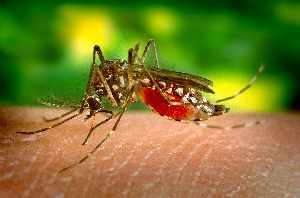
Five of the six West Nile virus cases this year resulted in neuro-invasive disease, the most severe form of the disease, and one case of uncomplicated West Nile fever. All six people, however, have survived the infection.
From the NM Department of Health:
Friday, August 30, 2019:
The New Mexico Department of Health (NMDOH) has identified five additional cases of West Nile virus infection in residents of Bernalillo, Doña Ana, San Juan and Valencia counties, since the first case was reported in early August.
West Nile virus is the leading cause of mosquito-borne disease in the continental United States. It is most commonly spread to people by the bite of an infected mosquito, and there are no vaccines to prevent or medications to treat it in people
Five of the six West Nile virus cases this year resulted in neuro-invasive disease, the most severe form of the disease, and one case of uncomplicated West Nile fever. All six people, however, have survived the infection.
There were seven cases of human West Nile virus infection in New Mexico last year and 33 cases in 2017. Increased rain routinely brings more mosquitoes, which can transmit West Nile virus, among other diseases. It only takes one bite from an infected mosquito for a person to get sick.
“West Nile Virus can be dangerous, but New Mexicans can take precautions to protect themselves and their families” said Department of Health Secretary Kathy Kunkel. “The fastest, easiest ways are to use insect repellent and wear protective clothing where mosquitoes may be active.”
Specifically, to prevent bites and disease NMDOH recommends residents
- Use an approved insect repellent every time they go outside and follow the instructions on the label. Among the EPA-approved repellents are those that contain DEET, picaridin, IR3535 and oil of lemon eucalyptus/para-menthane-diol.
- Regularly drain standing water, including water collecting in empty cans, tires, buckets, clogged rain gutters, saucers under potted plants, birdbaths, wading pools, and pet’s water bowls. Mosquitoes that spread West Nile virus breed in stagnant water and can do so in objects as small as a bottle cap.
- Make sure rain barrels are tightly screened.
- Wear long sleeves and pants at dawn and dusk when mosquitoes are most active.
- Use air conditioning or make sure there are screens on all doors and windows to keep mosquitoes from entering the home.
Mosquitos will likely continue to be a problem for months until the first hard freeze in your community.
People 50 years and older and those with chronic conditions are at a higher risk of becoming seriously ill or dying when they become infected with the virus. If people have symptoms and suspect West Nile virus infection, they should contact their healthcare provider.
Symptoms of the milder form of illness, West Nile fever, can include headache, fever, muscle and joint aches, nausea and fatigue. People with West Nile fever typically recover on their own, although symptoms may last for weeks to months. Symptoms of West Nile neuro-invasive disease can include those of West Nile fever plus neck stiffness, stupor, disorientation, coma, tremors, convulsions, muscle weakness and paralysis.
For more information, including fact sheets in English and Spanish, about how to protect against West Nile virus, visit the West Nile Virus section of the NMDOH website.

 Sheriff's Office Investigates Fatal Shooting
Sheriff's Office Investigates Fatal Shooting
 Suspect Arrested in Farmington Murder Case
Suspect Arrested in Farmington Murder Case
 Farmington Temple Opens this Summer
Farmington Temple Opens this Summer
 Police: Farmington Child Abuse Suspect Killed in Home
Police: Farmington Child Abuse Suspect Killed in Home
 College Opens new Student Health Center
College Opens new Student Health Center
 Farmington Couple Accused of Severe Child Abuse
Farmington Couple Accused of Severe Child Abuse


